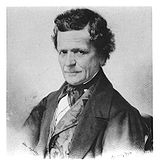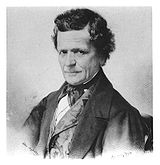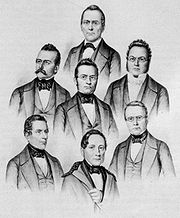
Stefano Franscini
Encyclopedia

Switzerland
Switzerland name of one of the Swiss cantons. ; ; ; or ), in its full name the Swiss Confederation , is a federal republic consisting of 26 cantons, with Bern as the seat of the federal authorities. The country is situated in Western Europe,Or Central Europe depending on the definition....
politician
Politician
A politician, political leader, or political figure is an individual who is involved in influencing public policy and decision making...
and statistician
Statistician
A statistician is someone who works with theoretical or applied statistics. The profession exists in both the private and public sectors. The core of that work is to measure, interpret, and describe the world and human activity patterns within it...
. He was one of the initial members of the Swiss Federal Council
Swiss Federal Council
The Federal Council is the seven-member executive council which constitutes the federal government of Switzerland and serves as the Swiss collective head of state....
elected in 1848 and Switzerland's first native Italian speaking federal councillor. Franscini was affiliated to the Liberal Radical Party of Switzerland
Free Democratic Party of Switzerland
The Free Democratic Party was a classical liberal political party in Switzerland. It was one of the major parties in Switzerland until its merger with the smaller classical liberal Liberal Party, to form FDP.The Liberals on 1 January 2009....
. During his office tenure he held the Department of Home Affairs. Important elements of his political legacy include political reforms in the Ticino
Ticino
Canton Ticino or Ticino is the southernmost canton of Switzerland. Named after the Ticino river, it is the only canton in which Italian is the sole official language...
during the 1830s and 1840s, Switzerland's first federal population census in 1850, and the creation of the Swiss Federal Institute of Technology
ETH Zurich
The Swiss Federal Institute of Technology Zurich or ETH Zürich is an engineering, science, technology, mathematics and management university in the City of Zurich, Switzerland....
in 1854/1855.
Early life and education (1796-1824)
Franscini was born in the village of BodioBodio
Bodio is a municipality in the district of Leventina in the canton of Ticino in Switzerland.-History:Bodio is first mentioned in 1227 as Boidi. During the Middle Ages, Bodio and the now abandoned village of Simbra formed a Degagna in the Giornico area...
, to a farmer's family with humble backgrounds. Until the age of eleven, he visited a winter school run by a priest in the neighbouring village Personico
Personico
Personico is a municipality in the district of Leventina in the canton of Ticino in Switzerland.-History:Personico is first mentioned in 1227 as Prexonego. During the Middle Ages, it belonged to the Vicinanza of Giornico. The village church of SS. Nazario e Celso was first mentioned in 1256...
. From 1808 to 1814, he attended the priests' seminary in Pollegio
Pollegio
Pollegio is a municipality in the district of Leventina in the canton of Ticino in Switzerland, located in the lower Leventina .- History :...
, from where he was sent to continue his education and training at the archiepiscopal seminary for priests in Milan
Milan
Milan is the second-largest city in Italy and the capital city of the region of Lombardy and of the province of Milan. The city proper has a population of about 1.3 million, while its urban area, roughly coinciding with its administrative province and the bordering Province of Monza and Brianza ,...
. In 1819, he abandoned his religious classes for the sake of studying history, law, political economics, and pedagogy, financing his studies by working as a teacher and author of textbooks. He became friends with Carlo Cattaneo
Carlo Cattaneo
Carlo Cattaneo was an Italian philosopher, writer and patriot.-Biography:Cattaneo was born in Milan; he died in Castagnola, close to Lugano in the Swiss canton of Ticino, where he had spent the last twenty years of his life in exile.A republican in his convictions, during his youth he had taken...
, who was a member of the liberal Carboneria
Carbonari
The Carbonari were groups of secret revolutionary societies founded in early 19th-century Italy. The Italian Carbonari may have further influenced other revolutionary groups in Spain, France, Portugal and possibly Russia. Although their goals often had a patriotic and liberal focus, they lacked a...
at the time, and who introduced Franscini to Milan's liberal political circles as well as to the works of political economist Melchiorre Gioia, sparking Franscini's lifelong interest in economical statistics. In 1823, he married Teresa Massari, with whom he had two children before she died in 1831.
Political career (1824-1848)
Franscini returned to Bodio in 1824, where he continued his work as a teacher and author, also writing articles on history, economics, and statistics for the Gazzetta Ticinese. He and his wife founded a girls' school in LuganoLugano
Lugano is a city of inhabitants in the city proper and a total of over 145,000 people in the agglomeration/city region, in the south of Switzerland, in the Italian-speaking canton of Ticino, which borders Italy...
based on the popular but controversial Bell-Lancaster method
Bell-Lancaster method
The Monitorial System was an education method that became popular on a global scale during the early 19th century. This method was also known as "mutual instruction" or the "Bell-Lancaster method" after the British educators Dr Andrew Bell and Joseph Lancaster who both independently developed it...
of mutual instruction.
In 1827, Franscini published Switzerland's first comparative statistical analysis ever in Statistica della Svizzera ("Statistics of Switzerland"). The explicitly liberal text and interpretation were also translated to German, and helped build Franscini's reputation in the political scene. One year later, he wrote Della pubblica istruzione nel Cantone Ticino ("On public education in the canton of Ticino"), in which he strongly criticized the backwardness of the cantonal government's education policy. Another political text of his was published in Zurich
Zürich
Zurich is the largest city in Switzerland and the capital of the canton of Zurich. It is located in central Switzerland at the northwestern tip of Lake Zurich...
in 1829, this time anonymously: Della riforma della Costituzione ticinese ("On the reform of the Ticino's constitution"), a call for reform, including an outline of how a liberal constitution should be drafted, and a strong criticism of the canton's restaurative and conservative institutions. Franscini continued to write for liberal journals such as L'Osservatore del Ceresio and Il Repubblicano della Svizzera italiana and between 1837 and 1840 published La Svizzera italiana, a reform program for the canton of Ticino, based on a comprehensive statistical analysis of its political and economic condition.
His writings were not well received by the authoritarian cantonal government under Landamano
Landammann
Landammann or Landaman, plural -männer, was the German title, meaning 'Amtmann of the land', used by the chief magistrate in certain Cantons of Switzerland and at times featured in the Head of state's style at the confederal level....
Giovanni Battista Quadri
, but his ideas were shared by a majority of the Ticino’s legislative body, and they helped effectuate a constitutional reform and change of government. In the following years of reform, Franscini held several cantonal political offices: As a state secretary, from 1830 to 1837 and from 1845 to 1847, he prepared resolutions and laws for the cantonal government. He himself was an elected member of this government between 1837 and 1845, and again between 1847 and 1848. Franscini also represented the canton of Ticino at the Tagsatzung
Tagsatzung
The Swiss Tagsatzung was the legislative and executive council of the Swiss confederacy from the beginnings until the formation of the Swiss federal state in 1848. It was a meeting of delegates of the individual cantons...
in 1841, 1843, 1845, and 1846. During his various tenures of office, Franscini was frequently sent on extraordinary missions, such as relief and calming missions in the Mendrisiotto during a cholera
Cholera
Cholera is an infection of the small intestine that is caused by the bacterium Vibrio cholerae. The main symptoms are profuse watery diarrhea and vomiting. Transmission occurs primarily by drinking or eating water or food that has been contaminated by the diarrhea of an infected person or the feces...
epidemic in 1836, and again during the famine
Famine
A famine is a widespread scarcity of food, caused by several factors including crop failure, overpopulation, or government policies. This phenomenon is usually accompanied or followed by regional malnutrition, starvation, epidemic, and increased mortality. Every continent in the world has...
of 1847. That same year he helped establish the armed defense in the Ticino to meet an unruly retreat of the Sonderbund
Sonderbund
The Sonderbund War of November 1847 was a civil war in Switzerland. It ensued after seven Catholic cantons formed the Sonderbund in 1845 in order to protect their interests against a centralization of power...
’s troops who were losing the War of the Sonderbund. On a national level, he attended intercantonal conferences on trade, customs, and postal services, and, in 1847, received a mandate to mitigate a peaceful change to liberal order in the Valais
Valais
The Valais is one of the 26 cantons of Switzerland in the southwestern part of the country, around the valley of the Rhône from its headwaters to Lake Geneva, separating the Pennine Alps from the Bernese Alps. The canton is one of the drier parts of Switzerland in its central Rhône valley...
after its defeat in the War of the Sonderbund. The Tagsatzung also sent him on a fact-finding mission to Naples
Naples
Naples is a city in Southern Italy, situated on the country's west coast by the Gulf of Naples. Lying between two notable volcanic regions, Mount Vesuvius and the Phlegraean Fields, it is the capital of the region of Campania and of the province of Naples...
, where Swiss mercenaries
Swiss mercenaries
Swiss mercenaries were notable for their service in foreign armies, especially the armies of the Kings of France, throughout the Early Modern period of European history, from the Later Middle Ages into the Age of the European Enlightenment...
had been accused of atrocious behavior while suppressing uprisings preceding the revolutions of 1848
Revolutions of 1848 in the Italian states
The 1848 revolutions in the Italian states were organized revolts in the states of Italy led by intellectuals and agitators who desired a liberal government. As Italian nationalists they sought to eliminate reactionary Austrian control...
.
Federal council and death (1848-1857)

Swiss Federal Council
The Federal Council is the seven-member executive council which constitutes the federal government of Switzerland and serves as the Swiss collective head of state....
’s first election which was held by the newborn Federal Assembly on November 16, 1848. He was elected in the first round, receiving 68 out of 135 valid votes - only one vote above the required absolute majority and the weakest result among the first seven members of the Federal Council.
For his entire tenure of eight years, Franscini supervised the Federal Department of Home Affairs
Federal Department of Home Affairs (Switzerland)
The Federal Department of Home Affairs is a department of the federal administration of Switzerland and serves as the Swiss ministry of the interior...
. The constitution of 1848 granted the cantons far more autonomy than later revisions after 1874 would ever allow again, and the department’s defined scope of responsibility was very small in comparison to what it would become later. Its primary focus was to organize the federal chancellory and federal archive. Other official duties included the collection of statistical data, supervision of religious rights and peace between confessions, sanitary measures in case of epidemic disease, and the standardization of weights and measurement.
One of the department’s most important accomplishments under Franscini’s supervision was the realization of a federal polytechnical institute
Institute of technology
Institute of technology is a designation employed in a wide range of learning institutions awarding different types of degrees and operating often at variable levels of the educational system...
. Franscini originally wished to create a national university
University
A university is an institution of higher education and research, which grants academic degrees in a variety of subjects. A university is an organisation that provides both undergraduate education and postgraduate education...
, built on ideals of patriotic identity, but rivalries among cantons forced him to abandon this plan for the sake of a school of technology. The Eidgenössische Polytechnische Schule
ETH Zurich
The Swiss Federal Institute of Technology Zurich or ETH Zürich is an engineering, science, technology, mathematics and management university in the City of Zurich, Switzerland....
in Zurich
Zürich
Zurich is the largest city in Switzerland and the capital of the canton of Zurich. It is located in central Switzerland at the northwestern tip of Lake Zurich...
held its first lectures in the autumn of 1855.
Franscini’s was able to apply his interest in statistics to his work in 1850, when the distribution of seats in the National Council by canton needed to be calculated, and he was commissioned to organize Switzerland’s first federal population census. Despite his strong belief in the value of collecting and evaluating statistical data – he saw it as one of a “socially progressive nation”’s duties - he wasn’t able to convince federal or cantonal politicians of its importance. With the aid of a private secretary, he was forced to evaluate the data of the census all by himself after Parliament failed to provide the necessary funds. His evaluations were published in a series of five volumes between 1851 and 1858, titled Beiträge zur Statistik der schweizerischen Eidgenossenschaft ("Contributions to the Statistics of the Swiss Confederation"). The Federal Statistical Office was not introduced until 1860, after Franscini’s death, along with a law on federal population censuses, which were to be held every ten years henceforth.
Though the federal council was always only elected by the Federal Assembly, there was an unwritten rule at the time, relinquished since the 1870s, that federal councillors should be confirmed in their home canton’s election for the National Council
National Council of Switzerland
The National Council of Switzerland is the lower house of the Federal Assembly of Switzerland. With 200 seats, it is the larger of the two houses....
as well. Franscini passed the test in 1851, but failed three years later, during the national elections of 1854, due to rivalries between the fractions of the Ticino’s liberals. He was obliged to run in delayed elections held in the canton of Schaffhausen
Canton of Schaffhausen
The Canton of is a canton of Switzerland. The principal city and capital of the canton is Schaffhausen.- History:Schaffhausen was a city-state in the Middle Ages, documented to have struck its own coins starting in 1045. It was then known as Villa Scafhusun. Around 1049 Count Eberhard von...
where he finally managed to obtain the desired percentage of votes. The official election for Federal Council held by the Federal Assembly in 1854 proved to be a struggle as well; Franscini did not receive the absolute majority of votes until the third round, and many members of the assembly had given their vote to his Ticinese friend Giovanni Battista Pioda
Giovanni Battista Pioda
Giovanni Battista Pioda was a Swiss politician and member of the Swiss Federal Council .He was elected to the Federal Council of Switzerland on 30 July 1857 and resigned on 26 January 1864. He was affiliated to the Free Democratic Party of Switzerland. During his time in office he held the...
.
Fatigued by the lack of appreciation for his hard work, and apprehensive of another political embarrassment during the upcoming national elections, Franscini decided to resign from office in 1857. He planned on working in the Ticino’s cantonal archive, but died unexpectedly in Bern, while still in office, on July 19, 1857. Eleven days later, Pioda was elected as his successor.

